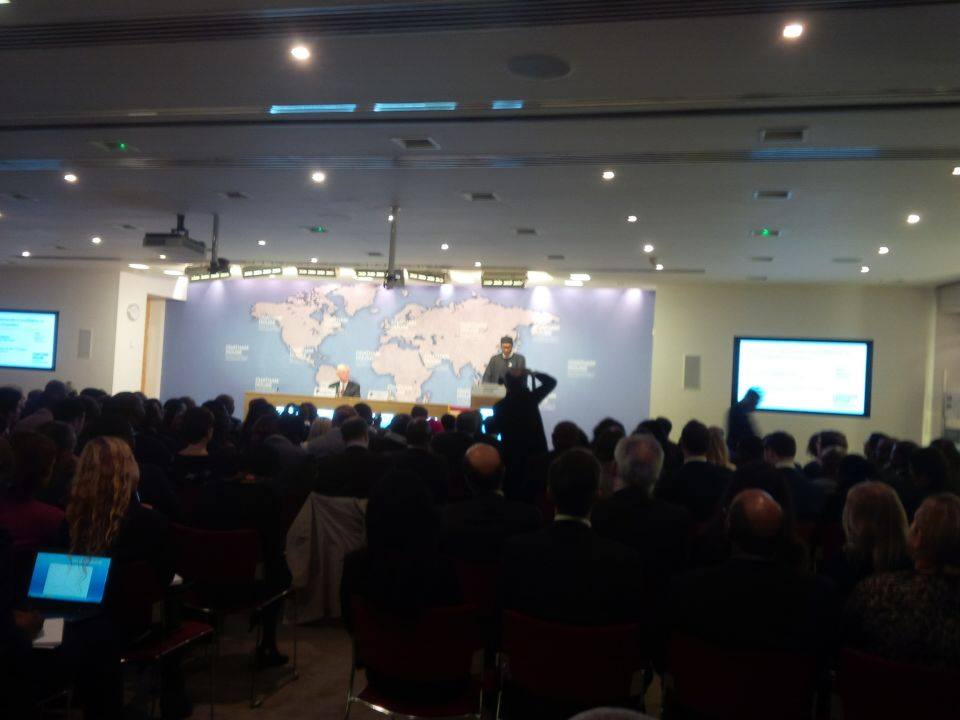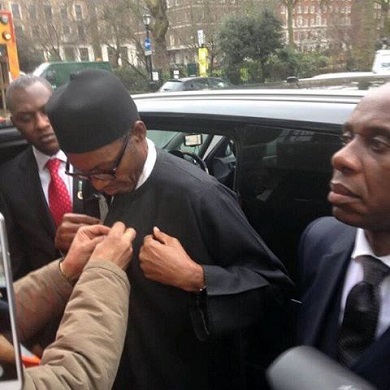Content analysis of General Muhammadu Buhari’s speech at Chatham House London on Thursday, February the 26th, is replete with too many baffling contradictions. Though he said that when he is speaking about Nigeria overseas, he normally preferred to be the country’s ‘public relations and marketing officer’, and would extol nation’s virtues in the hope of attracting investments and tourists, such dual posturing (being one thing in Nigeria and another overseas) or multiple personality disposition, makes it impossible to know where the General really stands on issues.
Throughout his campaigns in Nigeria, he had demonized the Jonathan Administration and painted a gory picture of a worsening economy and a failing State. In fact Buhari once or twice called Nigeria a failed state in his nationwide campaigns, to push to the limit how compelling regime change had become in Nigeria with himself as the messiah running to the rescue.
He admitted that with the fall of the Berlin Wall in 1989, the dissolution of the USSR in 1991, the collapse of communism and the end of the Cold War, democracy has become the dominant value and most preferred system of government across the globe. It is remarkable that Buhari has accepted and acknowledged the triumph of democracy as most pre-eminent political idea of our time. But whether he believes in democracy and truly sees military coups as now obsolete are questions for another day.
One thing that psychoanalytically played out in the said speech is that he was eagerly proving to the western world that he is now a democracy covert. Good news, you dare say! But alas, psychologists do not share such optimism; research is conclusively certain that psychologists, no matter their leanings and theoretical orientations, do not expect any radical change in behaviours in adulthood. It then means the best way of predicting an adult’s future behaviour remains his past, not his claims or promises.
Buhari correctly pointed out that representative democracy is not possible without elections and that the quality of the elections is as important and that mere elections do not democracy make. One wonders how he factors the pelting of President Goodluck Jonathan in parts of the north by his supporters who chant ‘sai Buhari’ as they did so; or as they tore down the President’s billboards and posters, leaving a video evidence of who they are and their motives.
Buhari equally agrees that the destination of democracy journey is democratic consolidation, which is attaining a state where democracy has become so rooted and so routine and widely accepted by all actors. His words: “With this important destination in mind, it is clear that though many African countries now hold regular elections, very few of them have consolidated the practice of democracy”. If Buhari knows that imperfect elections is a stage of democratic development in Africa and in Nigeria, why is he and the APC leaders threatening anarchy and forming an alternative Government if the 2015 witnessed such flaws himself has admitted here? Is he not retuning coups, which he has tried so hard to repudiate in the Chatham House speech as anachronistic?
One must however agree with General Buhari that good elections and consolidated democracy cannot be an end in themselves unless democracy delivers on the promise of choice, of freedoms, of security of lives and property, of transparency and accountability, of rule of law, of good governance and of shared prosperity. What also cannot be missed in these recounted lofty ideals is the fact that APC and Buhari particularly have not promoted them in anyway even though they now promise same should they win the Presidency.
One fact Buhari and the APC cannot deny is that Nigeria’s fourth republic is in its 16th year and the coming general election, the fifth in a row, and Buhari himself called it “a major sign of progress for us, given that our first republic lasted five years and three months, the second republic ended after four years and two months and the third republic was a still-birth”. But this well acknowledged progress is now gravely threatened by the APC for promoting violence in the electioneering campaigns and for threatening to form an alternative Government if the elections do go their way.
Buhari says he sees in Nigeria, the prospects of a ‘peaceful’ alternation of power as happened in Ghana, Senegal, Malawi and Mauritius in recent times where the incumbents lost, and that the prospects of democratic consolidation in Africa will be further deepened when that eventually happens in Nigeria. But fact is: APC is going about this in anyway but peaceful and openly manipulating the process. Buhari and APC have made huger than truly real the problems of security, economic and social uncertainties in Nigeria. Though there is no denying that Nigeria is being confronted with enormous challenges, Buhari and APC, through misinformation and disinformation, have lied too much and denied much more of the actual achievement of President Jonathan and the PDP.
On insecurity and Boko Haram insurgency for example, there is evidence that Buhari and the APC do not want the Government to deal a decisive blow on the insurgents. Two statements credited to Buhari, which have not been denied since they made the rounds, point to this. The General was quoted to have said: “fight against insurgency is anti-north” and “Nigerian Government must extend amnesty to Boko Haram members as it did to the Niger Delta militants”. Now, the same Buhari, seeing that the Federal Government is about wiping out Boko Haram, is at this moment changing his views. Speaking to the BBC after his Chatham House address, he contradictorily said, “There will be no amnesty for Boko Haram.”
Buhari however agrees that President Joanthan is working. Hear him: “After the rebasing exercise in April 2014, Nigeria overtook South Africa as Africa’s largest economy. Our GDP is now valued at $510 billion and our economy rated 26th in the world. Also on the bright side, inflation has been kept at single digit for a while and our economy has grown at an average of 7% for about a decade”. He however also said the growth was yet to address three questions, namely: what is happening to poverty? what is happening to unemployment? And, what is happening to inequality? But these germane questions are being addressed by President Jonathan through the unlocking of the Agriculture potential, infrastructure development, youth empowerment, etc.
Buhari also highlighted that corruption will have no place if he got elected and the corrupt will not be appointed into his administration but quickly added he would not punish those who stole before he became President. This is not only wrong but also contradictory. Does it now mean people could loot and then go free to enjoy their loot?
Jonathan’s approach is much better; In his unique way of fighting corruption by checkmating it and handing over the case files to the Independent Corrupt Practices Commission (ICPC), Jonathan has targeted the sources the mean cabals manipulate in the system to steal Government funds in large lumps and plugged them off. One huge outlet of massive corruption, which Jonathan plugged, is ending fuel subsidy scam. The same applies to fertilizer distribution bootlegging and scams by removing the rogue middlemen and introducing electronic wallets for all the over 10 million farmers nationwide, each of who was given a mobile phone free.
The next is the unbundling and selling off of NEPA, which has ended yet another source of massive looting of the economy and fleecing of the masses by some cabals. Then his removal of over 63 thousand ghost workers from federal civil service yet another move that saved over 208 billion naira annually. Jonathan also handed over the Nigerian Ports Authority verification to a third party and eliminated port frauds. 15 thousand ghost pensioners have also just been discovered and that saved billions of naira too. This also put some cabals out of business.
In all this, one can easily also see the rather less dramatic but more effective way and manner President Jonathan has fought and reduced corruption in Nigeria. Fact is: Jonathan has secured more convictions of corrupt persons than the Obasanjo and Buhari regimes put together. No wonder Transparency International rates both Buhari and Obasanjo’s regimes as more corrupt than that of Jonathan, the country moving from 2nd most corrupt country in the world in 2004 under Obasanjo, to over 30 places in 2014 under Jonathan. These are hard facts being whittled down or denied by the propagandists.
As a man running from his shadows (his past), Muhammadu Buhari protested the references to him as a former dictator in many respected British newspapers, including the well regarded Economist and told his audience that dictatorship goes with military rule, For a fact, as Buhari himself said; “some military might be less dictatorial than others”, most Nigerians, as Professor Wole Soyinka noted, see his regime as most brutal and fear a return to his kind of extreme dictatorship.
Buhari’s life after his unfeeling dictatorship has not been inspiring either. The General could be a good Muslim without being an extremist; he could have promoted his religion without championing sharia; he could have been less violent in is public utterances and avoided chilling comments like “2015 election will be bloody” and “dogs and baboons will be soaked in blood if elections are rigged”; he could have been a firm leader without backdating decrees to hound and kill the innocent ones; and so on.
So, when Buhari said, ‘Before you is a former military ruler and a converted democrat who is ready to operate under democratic norms and is subjecting himself to the rigours of democratic elections for the fourth time’, many were not fooled. Can Buhari who refused to appear before the Oputa Panel, or attend Presidential Debate or present to the press a photocopy of his school certificate (if he has), which has been in contention, be able to allow the quintessence of separation of powers as President? The prospects of growth of democracy under a former dictator are bleak, a proved by Obasanjo who remained a dictator even as a civilian President. Buhari cannot be different.
–
- Law Mefor, Forensic Psychologist and Journalist, is National Coordinator, Transform Nigeria Movement (TNM), Abuja; email: lawmefor@gmail.com




